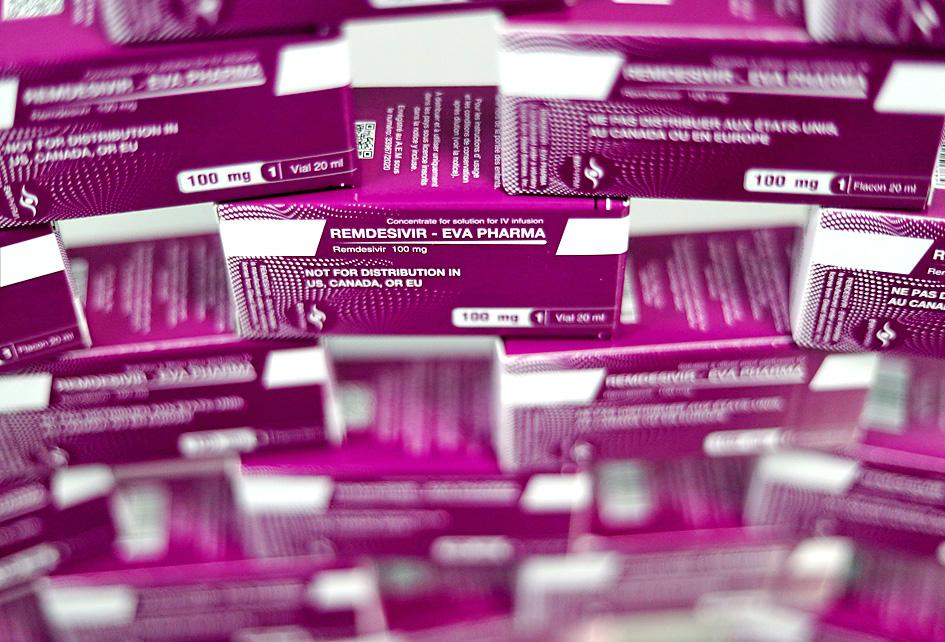Taiwanese researchers have found that combining an existing immunosuppressant drug with the COVID-19 medication remdesivir could suppress the ability of the virus to replicate, and thus could be a possible new treatment for the disease.
Lee Shiow-ju (李秀珠), an investigator with the Institute of Biotechnology and Pharmaceutical Research at the National Health Research Institutes, said remdesivir was once seen as a promising cure for COVID-19, but it never delivered on that promise.
Taiwanese doctors currently only use remdesivir to treat hospitalized COVID-19 patients in need of oxygen therapy and patients put on non-invasive ventilation, Lee said.

Photo: Reuters
Meanwhile, researchers in Taiwan have been trying to take advantage of existing drugs for their known safety profiles to expedite the discovery of effective and safe COVID-19 treatments.
After screening 230 prescription drugs covered by the National Health Insurance System, Lee said her team found that cyclosporine, an immunosuppressant widely used to prevent organ transplant rejection, could significantly reduce infection by coronaviruses.
Cyclosporine suppresses the activity of the immune system by inhibiting the activity and growth of T cells and the production of interleukin-6 (IL-6), a substance in the body that causes inflammation, Lee said.
In particular, IL-6 has been seen as an inflammatory marker for severe COVID-19 infections through its production of cytokines — small proteins that control the activity of other immune system cells.
A sudden increase in cytokines, known as a cytokine storm, can lead to serious inflammatory syndromes, and it has been associated with severe cases of COVID-19. Cyclosporine inhibits the production of those cytokines.
Cyclosporine has been on the market for years, making it highly accessible locally without the need to import drugs from overseas, Lee said.
Moreover, her team has found in simulations using cell lines (cells that are grown and then used to test candidate drugs) that the combination of cyclosporine and remdesivir are more effective in inhibiting coronaviruses from replicating than when the drugs are used separately.
The finding suggests that the combination of the two drugs merits further study as a possible treatment for COVID-19, she said.
However, follow-up clinical trials need to be conducted to prove the initial findings, Lee said.

Alain Robert, known as the "French Spider-Man," praised Alex Honnold as exceptionally well-prepared after the US climber completed a free solo ascent of Taipei 101 yesterday. Robert said Honnold's ascent of the 508m-tall skyscraper in just more than one-and-a-half hours without using safety ropes or equipment was a remarkable achievement. "This is my life," he said in an interview conducted in French, adding that he liked the feeling of being "on the edge of danger." The 63-year-old Frenchman climbed Taipei 101 using ropes in December 2004, taking about four hours to reach the top. On a one-to-10 scale of difficulty, Robert said Taipei 101

Nipah virus infection is to be officially listed as a category 5 notifiable infectious disease in Taiwan in March, while clinical treatment guidelines are being formulated, the Centers for Disease Control (CDC) said yesterday. With Nipah infections being reported in other countries and considering its relatively high fatality rate, the centers on Jan. 16 announced that it would be listed as a notifiable infectious disease to bolster the nation’s systematic early warning system and increase public awareness, the CDC said. Bangladesh reported four fatal cases last year in separate districts, with three linked to raw date palm sap consumption, CDC Epidemic Intelligence

US climber Alex Honnold left Taiwan this morning a day after completing a free-solo ascent of Taipei 101, a feat that drew cheers from onlookers and gained widespread international attention. Honnold yesterday scaled the 101-story skyscraper without a rope or safety harness. The climb — the highest urban free-solo ascent ever attempted — took just more than 90 minutes and was streamed live on Netflix. It was covered by major international news outlets including CNN, the New York Times, the Guardian and the Wall Street Journal. As Honnold prepared to leave Taiwan today, he attracted a crowd when he and his wife, Sanni,

Taiwanese and US defense groups are collaborating to introduce deployable, semi-autonomous manufacturing systems for drones and components in a boost to the nation’s supply chain resilience. Taiwan’s G-Tech Optroelectronics Corp subsidiary GTOC and the US’ Aerkomm Inc on Friday announced an agreement with fellow US-based Firestorm Lab to adopt the latter’s xCell, a technology featuring 3D printers fitted in 6.1m container units. The systems enable aerial platforms and parts to be produced in high volumes from dispersed nodes capable of rapid redeployment, to minimize the risk of enemy strikes and to meet field requirements, they said. Firestorm chief technology officer Ian Muceus said